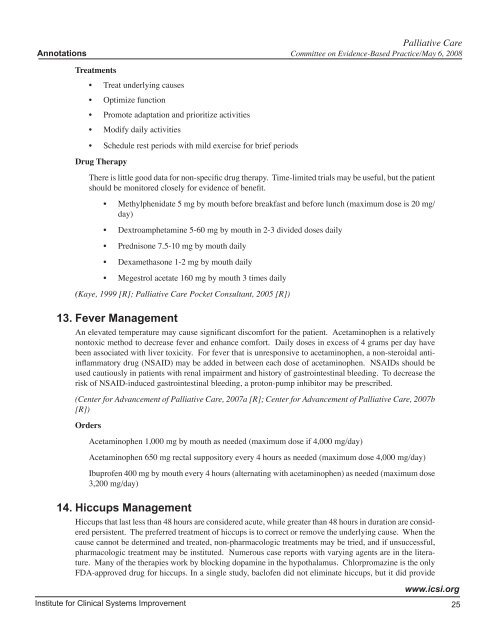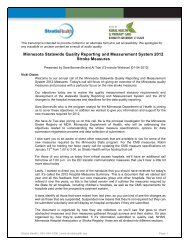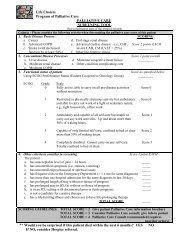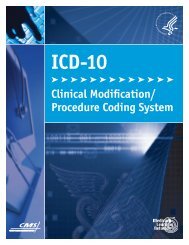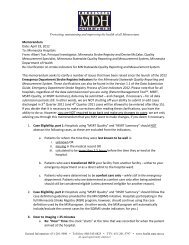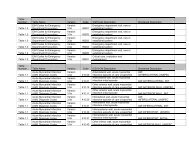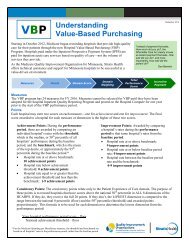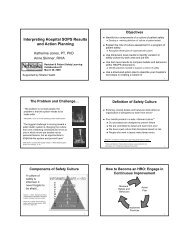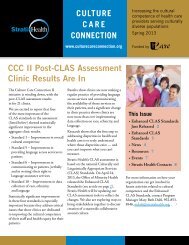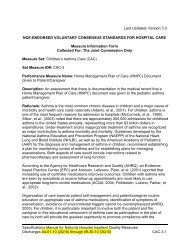Palliative Care Order Set - Stratis Health
Palliative Care Order Set - Stratis Health
Palliative Care Order Set - Stratis Health
Create successful ePaper yourself
Turn your PDF publications into a flip-book with our unique Google optimized e-Paper software.
<strong>Palliative</strong> <strong>Care</strong><br />
Annotations Committee on Evidence-Based Practice/May 6, 2008<br />
Treatments<br />
• Treat underlying causes<br />
• Optimize function<br />
• Promote adaptation and prioritize activities<br />
• Modify daily activities<br />
• Schedule rest periods with mild exercise for brief periods<br />
Drug Therapy<br />
There is little good data for non-specific drug therapy. Time-limited trials may be useful, but the patient<br />
should be monitored closely for evidence of benefit.<br />
• Methylphenidate 5 mg by mouth before breakfast and before lunch (maximum dose is 20 mg/<br />
day)<br />
• Dextroamphetamine 5-60 mg by mouth in 2-3 divided doses daily<br />
• Prednisone 7.5-10 mg by mouth daily<br />
• Dexamethasone 1-2 mg by mouth daily<br />
• Megestrol acetate 160 mg by mouth 3 times daily<br />
(Kaye, 1999 [R]; <strong>Palliative</strong> <strong>Care</strong> Pocket Consultant, 2005 [R])<br />
13. Fever Management<br />
An elevated temperature may cause significant discomfort for the patient. Acetaminophen is a relatively<br />
nontoxic method to decrease fever and enhance comfort. Daily doses in excess of 4 grams per day have<br />
been associated with liver toxicity. For fever that is unresponsive to acetaminophen, a non-steroidal antiinflammatory<br />
drug (NSAID) may be added in between each dose of acetaminophen. NSAIDs should be<br />
used cautiously in patients with renal impairment and history of gastrointestinal bleeding. To decrease the<br />
risk of NSAID-induced gastrointestinal bleeding, a proton-pump inhibitor may be prescribed.<br />
(Center for Advancement of <strong>Palliative</strong> <strong>Care</strong>, 2007a [R]; Center for Advancement of <strong>Palliative</strong> <strong>Care</strong>, 2007b<br />
[R])<br />
<strong>Order</strong>s<br />
Acetaminophen 1,000 mg by mouth as needed (maximum dose if 4,000 mg/day)<br />
Acetaminophen 650 mg rectal suppository every 4 hours as needed (maximum dose 4,000 mg/day)<br />
Ibuprofen 400 mg by mouth every 4 hours (alternating with acetaminophen) as needed (maximum dose<br />
3,200 mg/day)<br />
14. Hiccups Management<br />
Hiccups that last less than 48 hours are considered acute, while greater than 48 hours in duration are considered<br />
persistent. The preferred treatment of hiccups is to correct or remove the underlying cause. When the<br />
cause cannot be determined and treated, non-pharmacologic treatments may be tried, and if unsuccessful,<br />
pharmacologic treatment may be instituted. Numerous case reports with varying agents are in the literature.<br />
Many of the therapies work by blocking dopamine in the hypothalamus. Chlorpromazine is the only<br />
FDA-approved drug for hiccups. In a single study, baclofen did not eliminate hiccups, but it did provide<br />
www.icsi.org<br />
Institute for Clinical Systems Improvement<br />
25


